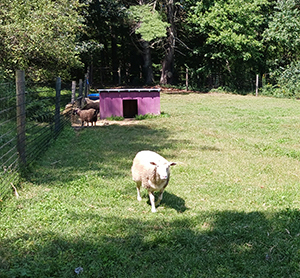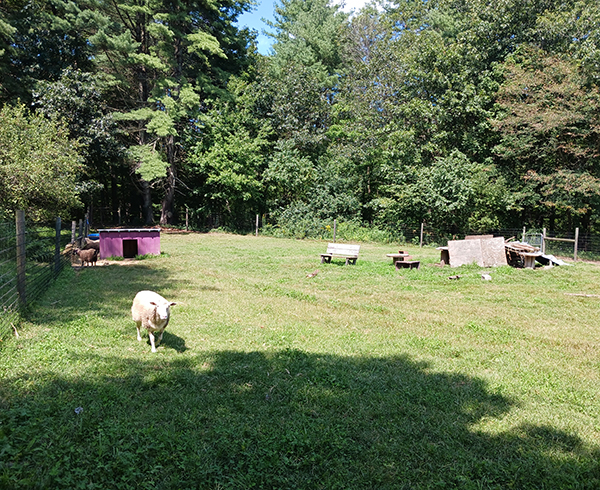
By Dan McClure
The John Sawyer House at 401 Main Street will soon be going up for sale. The current tenant, a non-profit organization called Cultivate Care Farms (CCF), has decided to exercise their right of first refusal and intends to buy the property from the current owners, Edwin and Debra Madera. To raise money for the purchase, CCF has launched a fund-raising campaign.
Originally started in 2017 by Deb Madera and Andrew Lapin as an outpatient clinical care farm for the treatment of children and adults with mental health and substance abuse issues, CCF pivoted in 2018 to focus on developmental issues affecting kids and adolescents. By 2019, both Madera and Lapin had left CCF, and Megan Moran assumed the role of Executive Director.
“That’s when we started seeing primarily children, adolescents and young adults,” Moran said in an interview conducted at the farm. “The diagnoses we deal with are along the lines of anxiety, depression, autism, PTSD, and ADHD.”
Situated on seven acres of land, CCF makes use of all the buildings on the property for their business, with the John Sawyer house serving as a central hub for administrative as well as clinical use. The animals appear well cared for and their pens are kept clean. The activities involved in doing so are reported to be important parts of the therapy process.
“Farm-Based Therapy involves five components,” Moran explained. “We’re doing hands-on engagement, sustainability work, mindfulness, community, and the life/death cycle. Our typical session lasts an hour. Over the course of the day, our farm manager makes sure that all of our animals are being tended to, woven into the session plans. We have over 60 animals, so the clients will help make sure they are fed and cleaned. We also have places on the farm for more personalized sensory input, places where they can focus on balance. Sometimes kids are more responsive if they are on a swing, or a slack line, or climbing hay bales. So, we’re looking at a broad spectrum of sensory input for kids, which we think is an advantage over more traditional office or home-based therapy. Being allowed to express their bodies’ physicality allows kids to be more open and develop a sense of confidence and resilience.”
The farm is home to goats, sheep, alpacas, chickens, cats, guinea pigs, and one Hermann’s tortoise (who is watched over, appropriately enough, by a tortoiseshell cat). All of the animals are approachable, even during feeding time.
“With the animals, the kids can also come to understand social dynamics,” Megan commented while a group of goats busily munched their feed. “This is Jojo, she gets right in there. She knows what she wants. She’s not worried about the bigger ones. So sometimes kids will align themselves with some of the animals. They see themselves in them, especially when some of the animals misbehave – like if they’re rowdy or pushing others. Then we get to talk about effective communication, or what is the right way to approach trying to get what you want.”
Stomping, snorting, and shoving are considered to be ineffective approaches to achieving success in social situations. Something to keep in mind when waiting in line at a fast-food establishment.
“All the animals have names, stories and families,” Moran added. “Kids feel like they are part of this space and have a legacy here. Most sessions are outside, they are active, kids are giving to the community in front of them. They are out of their heads and in their bodies.”
“I guess you could say I’m not just a board member but also a client,” Kirsten Hammann, a member of CCF’s Board of Directors, commented with a laugh. “My kid loves it. They actually skipped Coding Camp last week to have their session. They have sensory problems and autism and would never do talk therapy, but they blossomed here. In a world that insists everything is about computers, it apparently is not!”
In the baby goat pen, there was one adult among the kids. After pointing her out, Assistant Director Chelsey Brown explained that the doe was the mother of two of them.
“She had a really tough time feeding them,” Brown commented. “We actually bottle fed the twins for the first few months of life until they were old enough to eat on their own. They still have a relationship with their mother, even though she was not able to really provide for them. So, it’s a great example that can resonate with kids where maybe they have to deal with the fact that some parents give different care than others.”
Moran, Brown, and Hammann are convinced that the business needs to expand so they can continue to offer quality services to their clients. Plans have already been made about what to do with the land when it is purchased.
“When I started here, we were seeing about 30 people a week,” Moran said. “We’re now seeing, at the height of the academic year, 180 people a week. We want to expand our space and make additional clinical rooms, so we can accommodate more clients.
“Our waitlist is currently 60 people, and it will probably grow as the school year progresses, so trying to figure out how to meet the clinical needs of our community is a goal. We’re also interested in accessibility, so we’re figuring out how to take the farm to people who may not live in rural settings and may not have access to mental health treatment.”
“We’re in the process of doing two Institutional Review Board (IRB) approved research studies on the effectiveness of farm-based therapy,” Moran continued. “We’re also looking to potentially, over time, expand and extend our services to include members of the geriatric community. Most of our services are of a one-on-one nature, but one of the IRB studies we have going on is the therapeutic benefits of goats. This study is open to the community and we’re getting a lot of older folks who are interested in just being on the farm. So, we’re looking to see if we can do some sort of group-based access to our services.”
Details about CCF’s fundraising campaign can be found at: www.cultivatefarms.org/case-for-support


